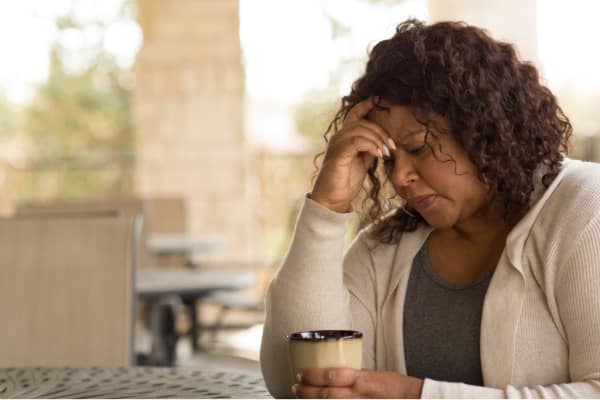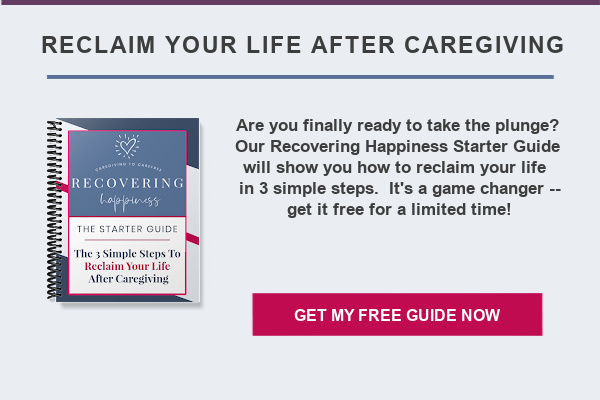
Are you experiencing caregiver grief and loss? Not sure what to do now that your loved one has died? Here are some practical tips to better cope.
We’ve all experienced grief, but grief as a caregiver carries its own set of unique challenges.
I remember as I was going through the grieving process, I realized that I was not only mourning the loss of my mother, but I was also lamenting everything I had lost along the path of caregiving. Losses like my loss of independence; loss of control; loss of the future as it had been imagined; loss of financial stability; loss of the relationship as it was; loss of personal freedom, sleep, and family harmony; loss of someone to share daily tasks with; the loss of someone to talk things over with, the loss of friends and supports, and many other things.
I know you can relate to these feelings of loss.
Because you focused for so long on the needs of your loved one and maybe you’ve had little opportunity to address your feelings of grief, and now the thought of confronting your grief can be overwhelming. Your first inclination might be to push it aside and bury it deep inside. And maybe you’ve done that.
But there is really no escaping grief. Sooner or later, it’s going to show up, and you’ll have to confront it.
Caregiver Grief and Loss Examined
As you cared for your loved one, you likely experienced anticipatory grief, grief, which is not exclusively tied to death. It is not uncommon to grieve long before the death of someone you love, particularly when the person you’re caring for has Alzheimer’s or dementia. You grieve that person and the loss of the person’s “former self.” You end up experiencing loss not only on a daily basis but anticipating the loss at the end of life, knowing the inevitable is coming. This can be just as painful as the loss associated with death.
With anticipatory grief, you likely experienced hopelessness, guilt, anger, denial, fear, confusion, and even rage but did not associate these emotions with your sorrow. You likely were adapting to multiple losses at the same time. These losses were a result of managing the care needs and the unpredictable nature of your loved one’s illness.
Ultimately, anticipatory grief was a way for us to prepare emotionally for the inevitable.
Then your loved one died, and your duties and interactions that made up your typical routine ended abruptly. You were no longer seeing the nurses and visiting professionals who may have become a significant, if temporary, part of your social circle. Additionally, if you cared for your loved one at home, changes in your home environment took place immediately. Bulky medical equipment, like a hospital bed, side table, and other medical equipment, was removed leaving a visual and noticeable void.
When your loved one dies, the feelings of relief and guilt set in complicating the grieving process even further.
It’s no wonder many of us struggle after our loved one is gone. There are so many moving parts here. So many emotions to sift through and sort out.
How Long Does Grieving Last After Caregiving Ends?
Grief affects each individual differently. No two people will grieve in the same way. Research has shown that intense grieving typically lasts from three months to a year and that many people experience profound grief for two or more years. Prolonged grief is not unusual and should not be looked at as abnormal grieving. The grieving process is dependent on many factors, including individual belief systems, religion, life experiences, and the type of loss suffered.
I know in my own life even years since my parents passing, I have moments when I feel a tremendous amount of grief that they are gone from my physical world. I felt this most recently at the birth of my grandchildren. I felt immense sadness that my parents would never know these children but also felt incredible regret that my grandchildren would never know or have the influence of these amazing people.
Grief is like the ocean, it has it’s own ebb and flow and depending on the circumstances and events happening in your own life will depend on how and when grief appears.
Symptoms of Grief and Loss for Caregivers
Grief affects our whole being. It can provoke physical, social, and emotional symptoms, as well as spiritual insights and turmoil.
Each of us will have different symptoms of grief. If you have had a previous loss, you may experience grief this time similarly or differently, depending on the situation, your relationship with the deceased, and other significant emotional factors in your life at the time.
Physical
- Crying
- Sighing
- Low energy/exhaustion/weakness/fatigue
- Headaches
- Stomach aches, loss of appetite
- Overeating, particularly comfort foods
- Sleep disturbance—too much or too little, disturbing dreams
- Feelings of heaviness, aches, pains
- Being super busy, pushing yourself to do too much
- Self-destructive activities such as drinking too much
Social
- Feeling alone
- Isolating yourself
- Finding it hard to pretend you feel ok, being pushed to be social by others
- Feeling detached from others
- Angry that other people’s lives are going on and yours is not
- Not wanting to be alone, feeling needy and clingy

Emotional
- Sadness, crying
- Anger/frustration/rage
- Confusion/overwhelm
- Guilt
- Worry/anxiety/panic
- Yearning
- Irritability
- Memory problems, feeling distracted, preoccupied
- Depression
- Euphoria
- Passive resignation
- Fluctuating emotions
- Sense of lack of control
- Others might see you as “unreasonable” or “overreacting.”
Spiritual
- Questioning your faith/the meaning of life/the meaning of suffering
- Questioning the reason for the death/disease
- Anger at God
- Coming closer to faith/God for solace
Stages of Grief
There are different stages of grief that most people go through. But there is no roadmap to deal with grief and there is no linear progression from one stage to the next. We experience these stages at different times during the grieving process depending on what is happening in our lives. For example, we may feel intense loneliness months after the death of a loved one because we are heading into the holiday season and this is the first Christmas since they’ve been gone.
The most well-known stages of grief were identified by Elizabeth Kubler-Ross in her classic book, “On Death and Dying.” They are:
- Denial (this isn’t happening to me!)
- Anger (why is this happening to me?)
- Bargaining (I promise I’ll be a better person if…)
- Depression (I don’t care anymore)
- Acceptance (I’m ready for whatever comes)
But in another book, “Living With An Empty Chair – A guide Through Grief, author Dr. Roberta Temes describes three particular types of behavior exhibited by those suffering from grief and loss. Here stages are:
- Numbness (mechanical functioning and social insulation)
- Disorganization (intensely painful feelings of loss)
- Reorganization (re-entry into a more ‘normal’ social life.)
What About Delayed Grief for Caregivers?
Grief isn’t logical.
It’s difficult to watch our loved ones suffer, and many of our loved ones have suffered quite some time before they pass on. As caregivers, we travel a long journey with our loved one toward death and there is generally a combination of relief and grief after the actual death occurs. We then face a period of recovery. There’s grief over the death, but relief that the pain and suffering is over.
We’re caught up in tending to the legal and logistical duties that accompany any death. But once the funeral is over, the rooms are emptied, the house is sold, we move on with our lives. Months or years later, the grief strikes seemingly out of nowhere. And we are left to ask, why now?
Sometimes, the shock of a loss or a need to work through immediate practical problems leads us to, consciously or not, ‘hold off’ our grief. It then catches up with us later, sometimes triggered by another loss, or even something small and otherwise inconsequential.
Delayed grief is just that: the grief that you don’t fully experience until quite a while after your loss. Those who feel a delayed grief reaction often describe it as a devastating sadness that hits them out of the blue. It might arrive a few weeks or months after the funeral, or sometimes even years later.
Once it does show up, and it always will, this delayed grief should be welcomed. It allows us the opportunity to work through our feelings of grief and in time to heal.

What Can Help As You Move Through Caregiver Grief and Loss?
When you’re grieving, it’s more important than ever to take care of yourself. You’ve already been under enormous stress as a caregiver. The added stress of this significant loss can further deplete your energy and emotional reserves. Paying particular attention to your physical and emotional needs will help you get through this difficult time.
Face your feelings. You can try to stifile your grief, but you can’t avoid it forever. To heal, you have to acknowledge the pain you’re feeling. Trying to avoid feelings of sadness and loss only prolongs the grieving process. Unresolved grief can also lead to complications such as depression, anxiety, substance abuse, and health problems. And as a caregiver, you may already be experiencing some of these emotional symptoms, further complicating the grieving process.
Express your feelings tangibly or creatively. Write about your loss in a diary. If you’ve lost a loved one, write a letter saying the things you never got to say; make a scrapbook or photo album celebrating the person’s life or get involved in a cause or organization that was important to your loved one.
Try to maintain a routine. It’s understandable that much of your old routine was lost at the passing of your loved one. But if you think about it, there are still parts of that routine that can be maintained moving forward. It’s also a perfect time to re-establish old habits you had to abandon as a caregiver. Maybe you walked with friends before caregiving would no longer allow it. Why not call those friends and re-establish that habit now? There’s comfort in routine and getting back to the activities that bring you joy and connect you closer to others can help you come to terms with your loss and aid the grieving process.
Don’t let anyone tell you how to feel, and don’t tell yourself how to feel either. Your grief is your own, and no one else can tell you when it’s time to “move on” or “get over it.” Let yourself feel whatever you feel without judgment, shame, or embarrassment. It’s ok to be angry, to yell at the heavens, to cry or not to cry. It’s also ok to laugh, to find moments of joy, and to let go when you’re ready. Grief is intensely personal, so be ok with how you chose to grieve.
Plan ahead for grief “triggers.” Anniversaries, holidays, and milestones can reawaken memories, feelings, and retrigger grief. Be prepared for an emotional wallop, and know that it’s completely normal. If you’re sharing a holiday or lifecycle event with other relatives, talk to them ahead of time about their expectations and agree on strategies to honor the person you loved. Not doing so is like ignoring the pink elephant in the room even though he’s standing in the middle of the living room.
Look after your physical health. For most caregivers, our physical health took a major back seat while caregiving. Now more than ever, it’s time to start looking after your physical health. When you feel healthy physically, you’ll be better able to cope emotionally. Combat stress and fatigue by getting enough sleep, eating right, and exercising. Don’t use alcohol or drugs to numb the pain of grief or lift your mood. This can lead to serious addiction issues and lead to significant health problems.
When To Seek Professional Help For Caregiver Grief and Loss
Contact a grief counselor or professional therapist if you:
- Feel like life isn’t worth living
- Wish you had died with your loved one
- Blame yourself for their death or for failing to prevent it
- Feel numb and disconnected from others for more than a few weeks
- Are having difficulty trusting others since the death
- Are unable to perform your normal daily activities
To recap, here are the steps and tips to help you deal with caregiver grief and loss:
- Examining caregiver grief and loss.
- How long does grieving last after caregiving ends?
- Symptoms of grief and loss for caregivers.
- Stages of grief.
- What about delayed grief for caregivers?
- What can help as you move through the stages of caregiver grief and loss?
- When to seek professional help.
Other Articles to help you as you move through your caregiving journey:


Leave a Reply